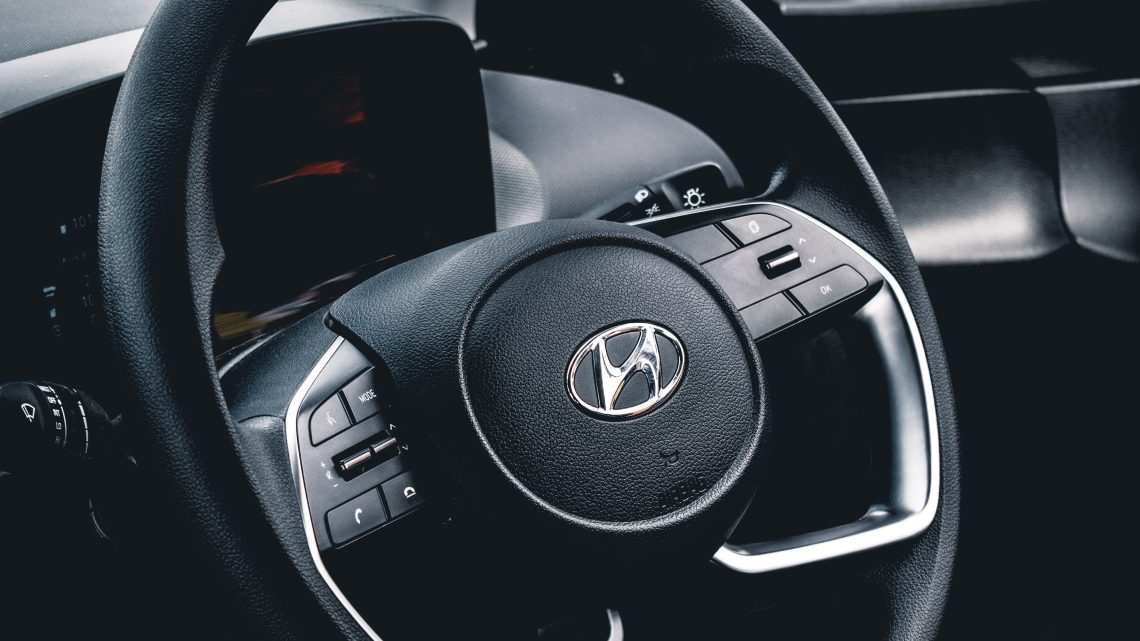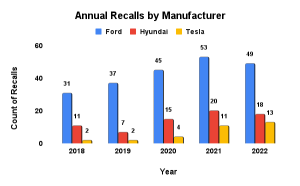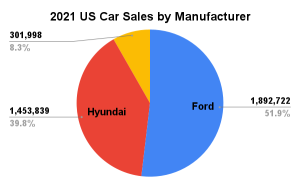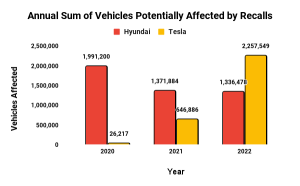Automakers issue vehicle recalls for numerous different reasons. Manufacturers can conduct these recalls independently, or they can be ordered directly by the NHTSA (National Highway Traffic Safety Administration).
Specifically, automotive recalls are often a result of design or manufacturing defects. Design defects are inherent flaws with an aspect of automotive design that can cause safety issues. Manufacturing defects are unrelated to flawed design, but mistakes like failing to comply with safety standards can create their own safety issues.
Through the use of NHTSA Recall data, it is possible to access and compare information between different major companies, such as Hyundai, Ford, and Tesla. After looking at the details of Hyundai’s August recall, comparing Hyundai to its industry competitors helps put this latest recall into perspective.
When measuring and comparing recall data from manufacturers, total recalls refer to only unique recalls for both make and model. When looking at the sum of vehicles affected by recalls for a specific manufacturer, that represents the total potential vehicles affected and isn’t unique to a single make or model. Together these metrics can provide further insight on vehicle recalls for a respective manufacturer.
Hyundai’s Most Recent Recall
With a reported 5% global market share in 2021, along with nearly $103 billion in revenues, Hyundai has firmly established itself as a major automotive industry leader worldwide. Despite manufacturing around 1.5 million vehicles per year, historically, Hyundai only accounts for 325 unique recalls. This ranks just inside the top 50 among qualifying automotive companies (44th).
However, the company is most recently making news for a substantial malfunction increasing the risk of fires for over 245,000 Hyundai Palisades for vehicle makes 2020-22. The fire risk is a result of a short-circuiting tow hitch accessory that can even occur within parked, turned off, and completely vacated cars.
What is Hyundai Doing About Their Recall?
Hyundai is still in the process of making a full repair available, but in the meantime Palisade owners have an interim repair available. Without any confirmed accidents, it appears that Hyundai Palisade owners that fit this designation can avoid potential injuries or damage by getting the tow hitch and fuse removed at respective dealerships (if necessary).
Also, owners of the recalled model have been advised to keep their vehicle parked outside, away from flammable materials due to the 25 fires reported already.
Automotive Recalls 2022 Projections
Early on in the year, it appeared that car safety recall rates for 2022 had somewhat stagnated. As of March 2022, there have only been 111 reported recalls total. To put that figure in perspective, that is projected to be the lowest amount since 2012 at its current pace.
While this may be the case for the majority of the automotive industry, some companies are still experiencing increased levels of complications. Pictured below are a few examples of companies like Hyundai, Ford, and Tesla that are on pace to exceed their 2021 unique recall count, if they haven’t already.
Comparing Hyundai Recall Totals to Ford and Tesla
As of August 2022, Hyundai and Ford are both on pace to surpass their 2021 unique recall count. With 13 unique recalls, Tesla has notably already outpaced their 2021 total with 13 unique recalls.
This is also the third consecutive year that Hyundai, Ford, and Tesla have seen an increase in unique recalls compared to the company’s previous annual total. Moving forward, it will be interesting to monitor the development of this potentially concerning trend among a few of the most prominent vehicle manufacturers for US consumers.
On the surface, Ford’s figures can appear somewhat alarming relative to the smaller recall totals listed for Hyundai and Tesla. As the fourth largest automotive company with $136.3 billion in revenues for 2021, Ford is responsible for a significant amount of vehicle production in the US. For example, pictured below is a chart that displays 2021 US manufacturer sales for each respective company.
This enables a more accurate representation of the factors influencing Ford and Hyundai’s larger recall totals compared to that of Tesla. However, Hyundai’s significantly smaller recall count for 2021–22 compared to Ford’s suggests a more positive outlook with this added context. While posting less than half the total unique recall count of Ford, Hyundai still maintained 1.4 million US car manufacturing sales.
Also, Tesla’s smaller year-to-year recall count totals weren’t necessarily an indicator of superior manufacturing. With less than a third of Hyundai’s manufacturing sales, they still had over half as many recalls in 2021.
How do Hyundai’s Latest Recalls Compare to Recent Tesla’s Recalls?
Looking closer at Hyundai and Tesla, the total annual sum of vehicles affected by recalls provides a distinctive comparison between the two companies. Factoring in all the previous information about Tesla having fewer US manufacturing sales in 2021 along with five fewer recalls in 2022, their total number of vehicles affected by their recalls is much larger.
This suggests that Tesla’s 2022 recalls have potentially impacted their products on a larger scale than that of Hyundai, despite posting the smaller total unique recall figure. The reason this metric is calculated as a sum is that multiple different recalls can still affect the same vehicle.
Therefore, adding up the total is a more accurate metric of how expansive the range of affected vehicles really is. In short, the same vehicle make and model can have a recall for two separate issues at the same time.
Important Takeaways
It’s important to understand the importance of context when trying to draw insights from any single statistic or chart. Hyundai, Ford, and Tesla’s NHTSA data is only part of the picture and shouldn’t be used to draw definitive conclusions about general vehicle safety or the effectiveness of any manufacturing processes.
With further evaluation and information, it’s certainly worthwhile to further investigate how the automotive industry and its consumers are affected by vehicle safety recalls from a specific manufacturer.
To check the status of your own vehicle and learn of a potential recall, access the NHTSA recall database and enter your respective information into the search bar.








No Comment